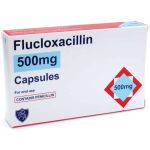Flucloxacillin, also known as floxacillin, is an antibiotic medication used to treat a variety of bacterial infections. It works by stopping the growth of bacteria. It's commonly prescribed for infections like skin infections, bone infections, and ear infections. It's important to note that flucloxacillin won't work against viruses or for infections caused by methicillin-resistant Staphylococcus aureus (MRSA).
the items you wish
to order

by our qualified
prescriber
to your door step
Please use the options provided to make your final selection.

| Brand | Medicine Strength | Size | Price |
|---|---|---|---|
| - | - | 28 Capsules | 75.00 |
It looks like you missed filling in questions from the last consultation.Click Here to submit your response.


It is the prescribers duty to ensure that the medicine is being used safely and appropriately. please answer a few questions about yourself to help us process your request.
Customer Service Team
Confidentiality & Authenticity Assured
- Fully Regulated UK Pharmacy
- Authentic UK sourced medicines only.
- Trading for more than 10 years.
- Information Governance lead ensures all data is confidential
Need Help With Your Questionnaire?
Our customer service team is on hand Monday-Friday to help you with your queries.
Please call us on 08009788956 or
email us at: headoffice@pharmacyplanet.com
|
|
|
THIS CONSULTATION IS NOT APPROPRIATE FOR YOUR CONDITION. PLEASE SEEK URGENT MEDICAL ADVICE. |
|
|
|
|
|
|
|
|
|
|
|
|
|
|
|
|
|
|
|
|
|
|
|
|
|
|
|
|
|
|
|
|
|
|
|
|
|
|
|
|
|
|
|
|
|
|
Flucloxacillin, also known as floxacillin, is a prescription antibiotic belonging to the penicillin family. It's a powerful weapon wielded clinicians to combat various bacterial infections.
How it Works
Flucloxacillin is a narrow-spectrum antibiotic, meaning it targets a specific range of bacteria. It works by interfering with their cell wall construction. Bacteria rely on a strong cell wall for protection and survival. Flucloxacillin disrupts this process, essentially weakening and killing the bacteria.
This antibiotic is commonly used to fight infections caused by susceptible:
Gram-positive bacteria: These bacteria, including Staphylococcus aureus (except MRSA) and Streptococcus pyogenes, are often culprits behind skin infections (impetigo, cellulitis), bone infections (osteomyelitis), and some ear infections (otitis media) in children.
Limitations:
Ineffective against viruses: Flucloxacillin won't work for illnesses caused by viruses, such as the common cold or flu. It's crucial for doctors to identify the infection type before prescribing this antibiotic.
MRSA resistance: Flucloxacillin is ineffective against Methicillin-resistant Staphylococcus aureus (MRSA), a strain of staph bacteria resistant to many antibiotics.
Dosage and Administration
Flucloxacillin comes in capsule, liquid, and injectable forms. The dosage and duration of treatment depend on the severity of the infection and the patient's condition. It's typically taken four times a day with consistent spacing. Completing the entire prescribed course is crucial to eliminate the infection completely.
Side Effects
Like most medications, flucloxacillin can cause side effects in some individuals. Common ones include:
- Nausea, vomiting, and diarrhoea
- Stomach upset
- Skin rash
Important Considerations
Allergy: People allergic to penicillin or other beta-lactam antibiotics should not take flucloxacillin.
Drug Interactions: Flucloxacillin can interact with other medications, so it's vital to inform your doctor about all medications you're taking.
Liver and Kidney Issues: Patients with pre-existing liver or kidney problems might require adjusted doses or monitoring.
Flucloxacillin is a valuable tool for treating specific bacterial infections. However, it's crucial to use it appropriately under a doctor's guidance to ensure effectiveness and minimize potential side effects. Always remember, antibiotics won't combat viruses, and completing the prescribed course is essential for optimal results.
People also ask
What is Flucloxacillin?
Flucloxacillin is an antibiotic belonging to the penicillin class. It's used to treat a variety of infections caused by bacteria. Unlike some antibiotics with a broader range, flucloxacillin specifically targets certain types of bacteria, making it a good choice for targeted treatment.
How does it work?
Flucloxacillin works by interfering with the bacteria's cell wall construction. Bacteria rely on a strong cell wall for protection and survival. Flucloxacillin disrupts the formation of this wall, weakening the bacteria and making them susceptible to the body's immune system or causing them to burst open and die.
What are the benefits of taking it?
Flucloxacillin is effective against a range of bacterial infections, including:
- Skin infections: Impetigo, cellulitis, boils
- Ear infections: Otitis media
- Bone infections: Osteomyelitis
- Respiratory tract infections: Pneumonia, bronchitis (when caused by susceptible bacteria)
- Dental infections
- Some types of food poisoning
How do I use it and its dosage?
Flucloxacillin typically comes in capsule form, although a liquid version may be available for children. The dosage and duration of treatment will depend on the specific infection being treated and your individual situation. It's crucial to follow your doctor's instructions exactly regarding dosage, frequency, and duration. Here are some general points to remember:
- Dosage: This can vary depending on the infection and your age. It's typically taken four times a day.
- Duration: Treatment can range from a few days to several weeks.
- Important: Always complete the entire prescribed course, even if you start feeling better, to ensure complete eradication of the bacteria and minimize antibiotic resistance.
Side effects & precautions
Flucloxacillin is generally well-tolerated, but some side effects can occur, including:
- Nausea, vomiting, and diarrhea (These can be minimized by taking the medication with food)
- Stomach upset
- Fungal infections (thrush) due to the disruption of natural gut flora
- Allergic reactions (skin rash, itching) - In rare cases, more severe allergic reactions can occur. Seek immediate medical attention if you experience difficulty breathing, wheezing, or swelling of the face or throat.
Precautions
- Inform your clinician about any allergies, particularly to penicillin or other antibiotics.
- Let your doctor know about any pre-existing medical conditions, especially kidney or liver problems.
- Flucloxacillin may interact with other medications, so be sure to disclose all medications and supplements you're taking to your clinician.
- Flucloxacillin is not recommended for pregnant or breastfeeding women unless deemed absolutely necessary by your clinician.










